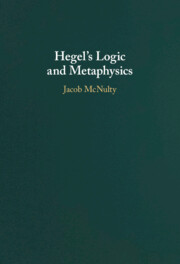Book contents
- Hegel’s Logic and Metaphysics
- Hegel’s Logic and Metaphysics
- Copyright page
- Dedication
- Contents
- Preface
- Acknowledgments
- Abbreviations
- Introduction
- Chapter 1 “Irrational Cognition of the Rational”
- Chapter 2 The Ontological Proof as “the True Critique of the Categories and of Reason”
- Chapter 3 Hegel’s Critique of “the Former Metaphysics”
- Chapter 4 Hegel’s Response to Kant’s Critique of Metaphysics
- Chapter 5 Logical Contradiction and Real Opposition
- Chapter 6 Mediated Immediacy: Concept, Judgment and Syllogism
- Chapter 7 Conclusion
- Works Cited
- Index
Chapter 2 - The Ontological Proof as “the True Critique of the Categories and of Reason”
Hegel on Kant’s Transcendental Logic
Published online by Cambridge University Press: 26 April 2023
- Hegel’s Logic and Metaphysics
- Hegel’s Logic and Metaphysics
- Copyright page
- Dedication
- Contents
- Preface
- Acknowledgments
- Abbreviations
- Introduction
- Chapter 1 “Irrational Cognition of the Rational”
- Chapter 2 The Ontological Proof as “the True Critique of the Categories and of Reason”
- Chapter 3 Hegel’s Critique of “the Former Metaphysics”
- Chapter 4 Hegel’s Response to Kant’s Critique of Metaphysics
- Chapter 5 Logical Contradiction and Real Opposition
- Chapter 6 Mediated Immediacy: Concept, Judgment and Syllogism
- Chapter 7 Conclusion
- Works Cited
- Index
Summary
Moving beyond Hegel's critique of Kantian general logic and the logic of the Aristotelian tradition, this chapter considers his critique of Kant's transcendental logic: specifically, the Analytic of the Critique of Pure Reason. It offers an account of Hegel's famed swimming objection, going beyond previous ones by arguing that the objection has a more specific target than is often realized: the Metaphysical Deduction of the Categories. It further explains Hegel's dissatisfaction of the efforts of two of Kant's successors (Reinhold and Fichte) to overcome the dilemma the swimming objection presents. Some attention is given here to Fichte's project of deriving the categories from a version of the cogito, that is post-Kantian rather than the one familiar from Cartesian rational psychology. In my view, it is Jacobi and Romanticism who furnish Hegel with the possibility of deriving the categories from a post-Kantian version of the ontological proof – though he rejects their irrationalism. This explains Hegel's provocative claim that the ontological argument, and its rigorous distinction between the modes of thinking appropriate to finite and infinite entities, constitutes the true self-critique of reason.
- Type
- Chapter
- Information
- Hegel's Logic and Metaphysics , pp. 63 - 107Publisher: Cambridge University PressPrint publication year: 2023

